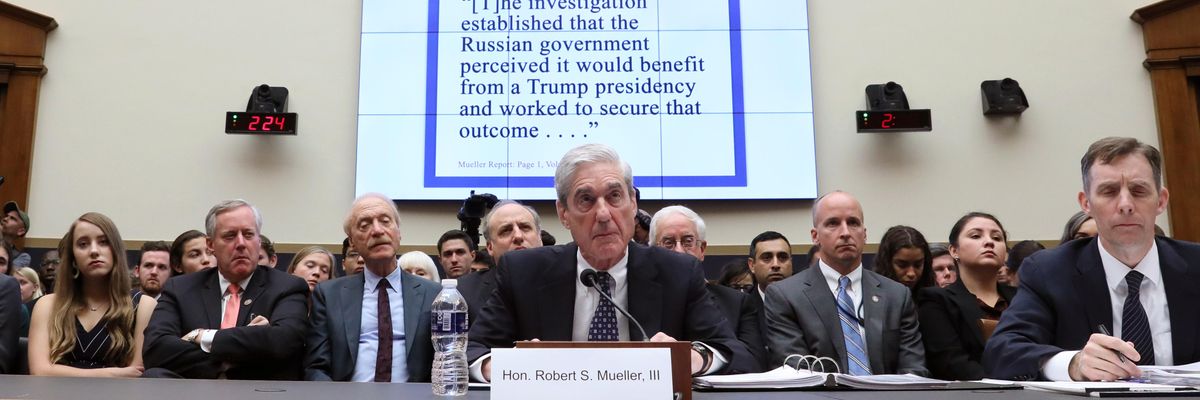Since the House Intelligence Committee wrapped up its epic hearing, there has been much talk as to the quality of former Special Counsel Robert Mueller's performance and whether his testimony was a "win" for Democrats or Republicans. This debate completely misses the point.
Mueller uttered no stunning soundbites for congressional Democrats to use in an impeachment campaign or in their quest for the White House in 2020. Mueller's testimony also didn't substantiate Attorney General William Barr's "no obstruction" conclusion in his four-page summary of the Mueller report, either.
Quite the contrary. After Mueller's testimony, the question isn't whether President Trump obstructed justice, but whether anybody cares to do anything about it.
There are three elements that prosecutors must prove in order to establish obstruction of justice. Elements of a crime are like ingredients in a recipe. All three must go in the bowl for prosecutors to be able to legally prove their case: an obstructive act, a connection to an official proceeding and corrupt intent. During Mueller's morning testimony before the
House Judiciary Committee, Democrats ticked off the evidence bearing on each of these elements with respect to numerous instances of attempted obstruction of the Mueller probe by Trump.
Republicans made no attempt to refute any one of them. Instead, they deflected, feigned outrage, and tried to make Mueller the villain. Ever-measured, Mueller didn't flinch. He was at his best when his integrity was under attack, reminding us expressly about the qualities of character that we should all seek in public servants.
Keep in mind that there is no fourth element of obstruction that requires a showing that someone actually succeeded in obstructing an investigation. Mueller confirmed that Trump can obstruct justice by merely attempting to obstruct justice. It's not a game-changer that former White House counsel Don McGahn didn't actually carry out Trump's directive to ask former Deputy Attorney General Rod Rosenstein to fire Mueller -- not when it comes to the crime of obstruction of justice. (In his four-page summary, Barr suggested otherwise, which is unfortunate for the rule of law.)
Nor does obstruction require a showing that evidence was somehow tainted as a result of the obstruction. Before he became attorney general, then-private citizen Barr wrote a strange June 2018 letter critiquing what he presumed to be Mueller's "obstruction theory," erroneously suggested that obstruction is somehow limited to evidence-tampering. The Mueller report carefully refuted that assertion as a matter of law. It's beside the point now.
But there's more. Mueller also testified that Trump's written testimony regarding Trump Tower Moscow "generally" wasn't complete or always truthful and that his team's encryption of communications and deletion of messages hampered the investigation. Mueller also testified that Trump's refusal to be questioned in person deprived the special counsel of "vital" information. Additionally, his testimony pointed out that, while truthful witness testimony goes to the "heart of any criminal case," six of Trump's former associates were either found guilty of or charged with lying -- including Paul Manafort, George Papadapolous, Michael Flynn, Michael Cohen, Rick Gates and Roger Stone.
As the saying goes, the fish stinks from the head.
Helpfully, Mueller also explained why obstruction of justice is a crime in the first place. Mueller's opening statement was unequivocal: "Our investigation of efforts to obstruct the investigation and lie to investigators was of critical importance. Obstruction of justice strikes at the core of the government's effort to find the truth and to hold wrongdoers accountable." If the president of the United States undermines this objective while overseeing the entire federal law enforcement apparatus, where does that leave our system of justice?
The question for America is not whether there's sufficient information to proceed with impeachment, but whether it's worth moving forward for the sake of preserving an accountable office of the presidency -- regardless of whether this Republican Senate predictably refuses to act on articles of impeachment from the House.
Mueller made clear that the Office of Legal Counsel's (OLC) internal policy memorandum -- concluding that indictment of a sitting president would be unconstitutional -- was a pivotal document. If it were not for that piece of paper, his office might have indicted Trump. If that were possible, the judicial branch of our three-branch system of government would have kicked into gear to hold the presidency accountable for wrongdoing. But as a practical matter, that route is off-limits. (It should be noted that there's serious debate over whether the OLC memo is correct as a constitutional matter).
The only possible means of avoiding dictatorial power in the White House, therefore, is through the ballot box. Congress either needs to exercise its oversight prerogative, or voters need to elect a different president in 2020, so that the criminal justice system can be brought to bear on private-citizen Trump. What's at stake is not Trump the man, but the very nature of the institution of the U.S. presidency.




